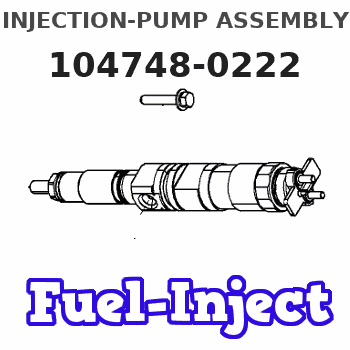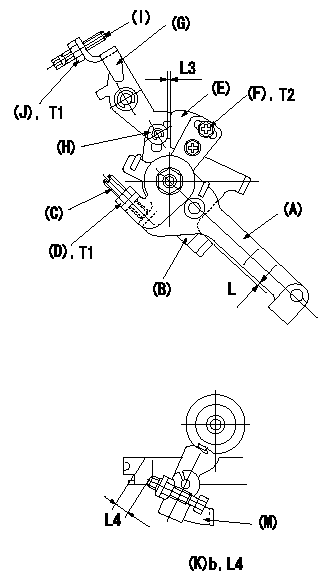Information injection-pump assembly
BOSCH
9 460 610 214
9460610214
ZEXEL
104748-0222
1047480222

Rating:
Components :
| 0. | INJECTION-PUMP ASSEMBLY | 104748-0222 |
| 1. | _ | |
| 2. | FUEL INJECTION PUMP | 104648-0222 |
| 3. | NUMBER PLATE | |
| 4. | _ | |
| 5. | CAPSULE | |
| 6. | ADJUSTING DEVICE | |
| 7. | NOZZLE AND HOLDER ASSY | |
| 8. | Nozzle and Holder | |
| 9. | Open Pre:MPa(Kqf/cm2) | |
| 10. | NOZZLE-HOLDER | |
| 11. | NOZZLE |
Include in #2:
104748-0222
as INJECTION-PUMP ASSEMBLY
Cross reference number
BOSCH
9 460 610 214
9460610214
ZEXEL
104748-0222
1047480222
Zexel num
Bosch num
Firm num
Name
Calibration Data:
Adjustment conditions
Test oil
1404 Test oil ISO4113orSAEJ967d
1404 Test oil ISO4113orSAEJ967d
Test oil temperature
degC
45
45
50
Nozzle
105000-2010
Bosch type code
NP-DN12SD12TT
Nozzle holder
105780-2080
Opening pressure
MPa
14.7
14.7
15.19
Opening pressure
kgf/cm2
150
150
155
Injection pipe
Inside diameter - outside diameter - length (mm) mm 2-6-840
Inside diameter - outside diameter - length (mm) mm 2-6-840
Transfer pump pressure
kPa
20
20
20
Transfer pump pressure
kgf/cm2
0.2
0.2
0.2
Direction of rotation (viewed from drive side)
Right R
Right R
Injection timing adjustment
Pump speed
r/min
1500
1500
1500
Average injection quantity
mm3/st.
37.5
37
38
Difference in delivery
mm3/st.
3
Basic
*
Injection timing adjustment_02
Pump speed
r/min
2400
2400
2400
Average injection quantity
mm3/st.
13.1
10.1
16.1
Injection timing adjustment_03
Pump speed
r/min
2125
2125
2125
Average injection quantity
mm3/st.
32.8
30.8
34.8
Injection timing adjustment_04
Pump speed
r/min
1500
1500
1500
Average injection quantity
mm3/st.
37.5
36.5
38.5
Injection timing adjustment_05
Pump speed
r/min
500
500
500
Average injection quantity
mm3/st.
31.5
29.5
33.5
Injection quantity adjustment
Pump speed
r/min
2400
2400
2400
Average injection quantity
mm3/st.
13.1
11.1
15.1
Basic
*
Injection quantity adjustment_02
Pump speed
r/min
2550
2550
2550
Average injection quantity
mm3/st.
4
Governor adjustment
Pump speed
r/min
350
350
350
Average injection quantity
mm3/st.
8
6
10
Difference in delivery
mm3/st.
2
Basic
*
Governor adjustment_02
Pump speed
r/min
350
350
350
Average injection quantity
mm3/st.
8
6
10
Governor adjustment_03
Pump speed
r/min
450
450
450
Average injection quantity
mm3/st.
4
Timer adjustment
Pump speed
r/min
100
100
100
Average injection quantity
mm3/st.
42
42
Basic
*
Speed control lever angle
Pump speed
r/min
350
350
350
Average injection quantity
mm3/st.
0
0
0
Remarks
Magnet OFF
Magnet OFF
0000000901
Pump speed
r/min
1500
1500
1500
Overflow quantity
cm3/min
460
330
590
Stop lever angle
Pump speed
r/min
1500
1500
1500
Pressure
kPa
578.5
549
608
Pressure
kgf/cm2
5.9
5.6
6.2
Basic
*
Stop lever angle_02
Pump speed
r/min
500
500
500
Pressure
kPa
294.5
265
324
Pressure
kgf/cm2
3
2.7
3.3
Stop lever angle_03
Pump speed
r/min
1500
1500
1500
Pressure
kPa
578.5
549
608
Pressure
kgf/cm2
5.9
5.6
6.2
Stop lever angle_04
Pump speed
r/min
2125
2125
2125
Pressure
kPa
745.5
716
775
Pressure
kgf/cm2
7.6
7.3
7.9
0000001101
Pump speed
r/min
1500
1500
1500
Timer stroke
mm
4.7
4.5
4.9
Basic
*
_02
Pump speed
r/min
1250
1250
1250
Timer stroke
mm
3.5
2.9
4.1
_03
Pump speed
r/min
1500
1500
1500
Timer stroke
mm
4.7
4.4
5
_04
Pump speed
r/min
2125
2125
2125
Timer stroke
mm
7.6
7
8.2
0000001201
Max. applied voltage
V
8
8
8
Test voltage
V
13
12
14
Timing setting
K dimension
mm
3.3
3.2
3.4
KF dimension
mm
5.8
5.7
5.9
MS dimension
mm
1.5
1.4
1.6
Control lever angle alpha
deg.
35
31
39
Control lever angle beta
deg.
45
40
50
Test data Ex:
0000001801 M-CSD ADJUSTMENT

M-CSD adjustment
1. Fixing the M-CSD
(1)At roller holder advance angle a adjust the lever shaft ball pin so that it contacts the roller holder.
(2)At this time, adjust the position of the M-CSD lever (A) using adjusting screw (C) so that the clearance L between the M-CSD lever (A) and the stopper (B) becomes L1. Then fix using nut (D).
T1T1
2. Fixing CSD lever plate (E)
(1)Make the clearance between the CSD lever (A) and the stopper (B) L2.
(2)Fix the CSD lever plate (E) using the bolt (F) so that the clearance between the intermediate lever (G)'s roller (H) and the CSD lever plate is L3.
T2T2
3. Fixing the FICD screw (I)
(1)Move the CSD lever (A) through its full stroke.
(2)Adjust the intermediate lever (G)'s FICD screw (I) so that the control lever (K)'s position is a [the clearance from screw (I) is L4]. Then fix using nut (J).
T1T1
Control lever position b, L4
----------
L1=0.5+2mm L2=0mm L3=4.0mm L4=6.2+-1mm T1=6~9Nm(0.6~0.9kgfm) T2=3.4~4.9Nm(0.35~0.5kgfm) a=0deg b=7deg
----------
L=L1=0.5+2mm L=L2=0mm L3=4.0mm L4=6.2+-1mm T1=6~9Nm(0.6~0.9kgfm) T2=3.4~4.9Nm(0.35~0.5kgfm) b=7deg
----------
L1=0.5+2mm L2=0mm L3=4.0mm L4=6.2+-1mm T1=6~9Nm(0.6~0.9kgfm) T2=3.4~4.9Nm(0.35~0.5kgfm) a=0deg b=7deg
----------
L=L1=0.5+2mm L=L2=0mm L3=4.0mm L4=6.2+-1mm T1=6~9Nm(0.6~0.9kgfm) T2=3.4~4.9Nm(0.35~0.5kgfm) b=7deg
Information:
Turbocharger
Turbocharger bearing failures can cause large quantities of oil to enter the air intake and exhaust systems. Loss of engine lubricant can result in serious engine damage.Minor leakage of a turbocharger housing under extended low idle operation will not cause problems as long as a turbocharger bearing failure has NOT occurred.When a turbocharger bearing failure is accomplished by a significant engine performance loss (exhaust smoke or engine speed up at no load), DO NOT continue engine operation until the turbocharger is repaired or replaced.
An inspection/check of your turbocharger will minimize unscheduled downtime and reduce the chance for potential damage to other engine parts.Inspect/Check
1. Remove the exhaust outlet and air inlet piping from the turbocharger. Visually check for oil leaks.2. Turn the turbine and compressor wheel by hand. The assembly should turn freely.3. Inspect the turbine wheel and compressor wheel for contact with the turbocharger housing. There should NOT be any visible signs of contact between the turbine or compressor wheels and the turbocharger housing.4. Check the compressor wheel for cleanliness. If only the blade side of the wheel is dirty, dirt and/or moisture is passing through the air filtering system. If oil is found only on the back side of the wheel, it indicates a possible turbocharger oil seal leak.The leak may be the result of extended engine operation at low idle or an intake air line restriction (plugged air filters), which causes the turbocharger to "slobber".* Maintain the compressor wheel/turbine housing by cleaning with standard shop solvents and a soft bristle brush.5. Check the end play and bearing clearance on the turbine wheel and shaft. If the measurements are not within specifications (see the Service Manual), the turbocharger must be repaired or replaced.6. When installing or replacing V-band clamps, position the gap (tightening screw) down if possible so any accumulation of moisture will drain away. Turbocharger components require precision clearances and balancing due to operation at high rotation (torsional) speeds. Severe Service Applications can accelerate component wear and may suggest the need to Inspect/Repair/Replace the cartridge at reduced intervals to ensure maximum reliability and retention of the full core.Removal and Installation
For removal and installation, or repair/replacement options of turbochargers, see your Caterpillar dealer. Refer to the Service Manual for this engine or consult your Caterpillar dealer for the procedure and specifications.Engine Mounts and Crankshaft Vibration Damper
Inspect/Check Engine Mounts
Caterpillar recommends checking the engine mounts for deterioration and proper bolt torque. This will prevent excessive engine vibration caused from improper mounting. See your Service Manual or Caterpillar dealer for recommended torque values.Inspect/Check Camshaft Vibration Damper
Damage to, or failure of the damper will increase torsional vibrations and result in damage to the crankshaft and other engine components. A deteriorating vibration damper will cause excessive gear train noise at variable points in the engine speed range.Rubber Damper
Your engine may be equipped with a standard Rubber Crankshaft Torsional Vibration Damper. A standard damper uses a rubber mounted ring to reduce crankshaft vibration. Some engines also have a Visconic Torsional Vibration Damper. A
Turbocharger bearing failures can cause large quantities of oil to enter the air intake and exhaust systems. Loss of engine lubricant can result in serious engine damage.Minor leakage of a turbocharger housing under extended low idle operation will not cause problems as long as a turbocharger bearing failure has NOT occurred.When a turbocharger bearing failure is accomplished by a significant engine performance loss (exhaust smoke or engine speed up at no load), DO NOT continue engine operation until the turbocharger is repaired or replaced.
An inspection/check of your turbocharger will minimize unscheduled downtime and reduce the chance for potential damage to other engine parts.Inspect/Check
1. Remove the exhaust outlet and air inlet piping from the turbocharger. Visually check for oil leaks.2. Turn the turbine and compressor wheel by hand. The assembly should turn freely.3. Inspect the turbine wheel and compressor wheel for contact with the turbocharger housing. There should NOT be any visible signs of contact between the turbine or compressor wheels and the turbocharger housing.4. Check the compressor wheel for cleanliness. If only the blade side of the wheel is dirty, dirt and/or moisture is passing through the air filtering system. If oil is found only on the back side of the wheel, it indicates a possible turbocharger oil seal leak.The leak may be the result of extended engine operation at low idle or an intake air line restriction (plugged air filters), which causes the turbocharger to "slobber".* Maintain the compressor wheel/turbine housing by cleaning with standard shop solvents and a soft bristle brush.5. Check the end play and bearing clearance on the turbine wheel and shaft. If the measurements are not within specifications (see the Service Manual), the turbocharger must be repaired or replaced.6. When installing or replacing V-band clamps, position the gap (tightening screw) down if possible so any accumulation of moisture will drain away. Turbocharger components require precision clearances and balancing due to operation at high rotation (torsional) speeds. Severe Service Applications can accelerate component wear and may suggest the need to Inspect/Repair/Replace the cartridge at reduced intervals to ensure maximum reliability and retention of the full core.Removal and Installation
For removal and installation, or repair/replacement options of turbochargers, see your Caterpillar dealer. Refer to the Service Manual for this engine or consult your Caterpillar dealer for the procedure and specifications.Engine Mounts and Crankshaft Vibration Damper
Inspect/Check Engine Mounts
Caterpillar recommends checking the engine mounts for deterioration and proper bolt torque. This will prevent excessive engine vibration caused from improper mounting. See your Service Manual or Caterpillar dealer for recommended torque values.Inspect/Check Camshaft Vibration Damper
Damage to, or failure of the damper will increase torsional vibrations and result in damage to the crankshaft and other engine components. A deteriorating vibration damper will cause excessive gear train noise at variable points in the engine speed range.Rubber Damper
Your engine may be equipped with a standard Rubber Crankshaft Torsional Vibration Damper. A standard damper uses a rubber mounted ring to reduce crankshaft vibration. Some engines also have a Visconic Torsional Vibration Damper. A